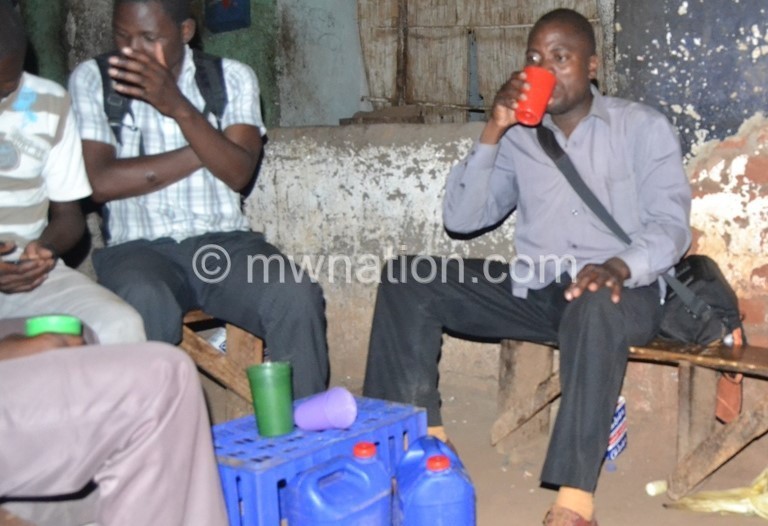Can Malawi succeed in regulating sanitation in shebeens?
A shebeen was originally an illicit bar or club where excisable alcoholic beverages were sold without a licence.
A township invention, shebeens are now an integral part of the Malawian rural experience, but the problem is that these makeshift pubs are extremely dirty with urine and human feaces sometimes all over the place.
Aisha Rajab, 30, lives next to a shebeen with her three children in Saidi Village, in the area of Traditional Authority (T/A) Ndindi in Salima and she is unhappy with sanitation around the shebeens in the area.
At first, Rajab had no problems with Tiyankhulenji Kambalame, 24, the shebeen owner, as a neighbour. But tensions have recently arisen between them because the shebeen patrons urinate outside Rajab’s house.
“My house is now a mess,” Rajab says. She had to wash the pathway of her house to remove the pungent smell and make the area safe and hygienic for children to play as her house has neither yard nor garden space and the children must share the public space with others.
“I have talked about the problem of public urination with community leaders who must reprimand Kambalame,” she adds.
She hopes community leaders will give Kambalame a timeframe during to construct pit latrines and urinals for her drunken customers.
Health surveillance assistant for T/A Ndindi, Robson Mangwere, says poor, inadequate and outright absence of personal and domestic sanitation and hygiene facilities are some of the major cases of waterborne and other hygiene-related diseases such as malaria.
He says there is need for government to enforce laws in shebeens to ensure that the environment is conducive for both customers and people living surrounding the shebeens.
But can Malawi succeed in regulating sanitation in shebeens?
In order to develop a strategy to reduce cases of waterborne diseases and improve nutrition and health, a German organisation – Welthungerhilfe (WHH) – commenced a pilot Health Clubs for Improved Hygiene and Nutrition (CLUBS) Project using the Participatory Hygiene and Nutrition Education (PHNE) project in traditional authorities (T/As) Chauma in Dedza and Maganga, Ndindi and Pemba in Salima.
The PHNE community facilitators’ chairperson Sefu Sidala says the project has not only addressed sanitation and hygiene concerns in homesteads, but also helped reduce cases of unhygienic practices in shebeens.
Sidala attributes this to the conceptual development process, which he said was grounded in a solid understanding of the problem situation and relevance in terms of community needs, patron needs and shebeen owner capacities and common interests in issues of safety.
“We noted at the outset that shebeens contribute significantly to health risks because of the manner in which imbibers relieve themselves. Hence, we decided to rope them in so that shebeen owners can become self-regulating in the end,” he expalins.
Salima WHH field coordinator Percy Chiphanda says his organisation, with funding from Gesellschaft für Internationale Zusammenarbeit (GIZ), is equipping communities, including the shebeen owners with skills to enable them to develop innovative approaches and technologies that can lead to radical and sustainable improvements in sanitation in their homesteads.
“The PHNE approach, which works through Community Health Clubs, was developed as part of a consultative and integrative process aimed at establishing a hygiene promotion strategy that gives the power to the community. It facilitates and fosters community-based decisions making processes that promote feasible sanitation, hygiene and nutrition solutions and keeping each other accountable,” he explains.
Chiphanda says his organisation believes that equitable improvement of sanitation services should be achieved by the combined efforts of the government and the beneficiaries, based on community involvement and participation, under the control and supervision of government through the Ministry of Health.
Malawi does not have a single national participatory approach or educational material for promoting the proper use and/or maintenance of toilets, pit latrines and urinals.
In addition, sanitation projects seldom appear to address the promotion of safe hygiene with regard to using toilets.
Authorities merely emphasise the need for public places to have adequate sanitation and hygiene facilities although responsibility for the provision of sanitation facilities in public places is not always obvious, especially when they are informal gathering places such as shebeens.
Ministry of Health chief director Chimwemwe Banda emphasises that it is government’s wish to ensure that essential sanitation services are available to all Malawians, and that the same are acceptable and accessible at a cost affordable to the country as a whole.
However, Banda says government is usually challenged by lack of resources to provide either training or raising awareness in basic safe hygiene for using flush toilets.
“Government, therefore, welcomes and appreciates efforts by various partners, including WHH to address challenges existing in the water, sanitation and hygiene sector,” she says.
Mangwere says the PHNE approach has led to the reduction of waterborne diseases, and elimination of cases of open defecation in the area.
“Following the introduction of the PHNE approach, this area has managed to reduce waterborne diseases by over 70 percent this year alone,” he explains.





